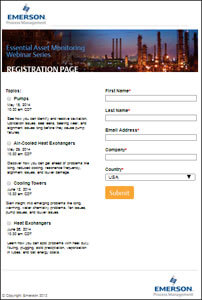Update and bump: A recorded version of this webinar is now available. Visit here for a listing of other recorded & archived webinars.
Original post: An unplanned shutdown can ruin your whole day, or two, or three… Not only do these unplanned shutdowns have impact on the people getting the process up and running again, they can impact promised delivery dates, financial performance, overall efficiency and throughput, and safety & environmental performance.
Pumps, critical for moving fluids through the process, can be one of the sources of this downtime. An average refinery, chemical, or petrochemical plant may have around 200 pumps in the process.

Nikki Bishop
Senior Applications Consultant
For most plants typically only 10% of the most critical pumps have online, continuous health monitoring. Another 40% are considered essential and are manually monitored. While many problems can be discovered, others cannot because issues can occur in between maintenance rounds. Some problems include plugged strainers, shaft misalignments, bearing wear, cavitation, low seal fluid pressure, and flow conditions operating outside of design limits.
Any of these conditions left untreated, can lead to failure and unplanned downtime. Nikki will share some headlines from plants where these failures have made news because of their impact on safety, the environment, and lost production.
She’ll explain how wireless instrumentation, including wireless vibration transmitters, can be deployed on the essential pumps to monitor for cavitation, vibration, strainer plugging, temperature, leak detection, and seal fluid levels. Data from the process and the equipment comes together with pre-engineered algorithms to provide early warning of impending failures and abnormal operations.
This early warning is presented in pump health displays that don’t require machinery experts to analyze. It’s like your car’s dashboard alerting you to problems without having to be a car mechanic to understand the alerts in detail.I hope you can join Nikki and bring some of your reliability questions and comments. This webinar is the first in a series which will also include:
- Air-Cooled Heat Exchangers: May 29, 2014 – 10:30 am CDT
- Cooling Towers: June 12, 2014 – 10:30 am CDT
- Heat Exchangers: June 26, 2014 – 10:30 am CDT
Register for any or all on the Essential Asset Monitoring webinar series page.





